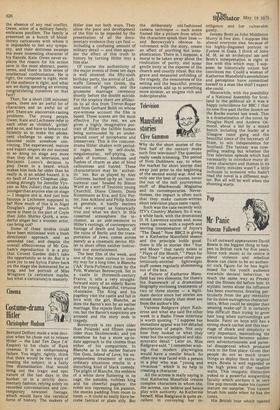Cinema
Costume-drama_ Hitler
Christopher Hudson
Bernard Delfont made a wise decision when he chose not to release Hitler — the Last Ten Days ('A' Empire) to his chain of Rank cinemas. It is an embarrassing failure. You might, rightly, think that there would be two ways of treating the subject: in a fairly free dramatisation that would bring out the tragic and epic nature of the last days in the bunker, or in a strictly documentary fashion, relying solely on recorded conversations and contemporary newsreel footage, which would have the veridical force of history. The makers of Hitler lose out both ways. They allow the pace and development of the film to be impeded by the presentation of all the documentary evidence they can find — including a confusing amount of military detail — and then squander the effect of this truth to history by turning Hitler into a film star.
Of course the authenticity of the major events of these ten days is well attested: the fifty-sixth birthday party, the arrival of Luft waffe General von Greim, the execution of Fegelein, and the gruesome marriage ceremony shortly before the double suicide. For the sceptics there are affidav its to all this from Trevor-Roper and from Gerhard Boldt on whose eye-witness account the film is based. These scenes are the most effective. For the rest, we are given a highly imaginative por trait of Hitler the fallible human being surrounded by an under ground court of sycophants and timeservers. This is the costume
drama Hitler: shaken with periodic rages, beset by self-doubt, megalomaniac, self-pitying, capable of humour, kindness and flashes of charm as also of blind callousness and hatred. These characteristics may be ' authentic' too. But as played by Alec Guinness, backed up by an 'international cast' headed by Simon Ward as a sort of Teutonic young Churchill, Diane Cilento, Doris Kunstmann as Eva, and Eric Porter, Joss Ackland and Philip Stone as generals, it hardly matters what we accept as historically true and what we don't. In this cossetted atmosphere the inclusion, as an aide-memoire to Hitler's rantings, of contemporary footage of death and famine, of the ruins of Berlin and the transportation of Jews, comes across merely as a cinematic device. Hitler in short offers neither instruction nor entertainment.
The best film of the week, and one of the most curious to come my way for a long time, is Blanche ('AA' Paris-Pullman) made by the Pole, Walerian Borowcyzk. Set in a castle in thirteenth-century France, it tells a very straightforward story of an elderly Baron and his young, beautiful, virtuous chatelaine. The King and his pageboy visit the castle and fall in love with the girl, Blanche, as does the Baron's son by an earlier marriage. She rejects their advances, but the Baron's suspicions are aroused and the story ends in tragedy.
Borowcyzk is ten years older than Polanski and fifteen years older than Skolimowski, and yet somehow he has a more up-todate approach to the cinema than either of his compatriots. In Blanche as in his earlier feature film Goto, Island of Love, his expressionless treatment of extraordinary situations results in a disturbing kind of black comedy. The plight of Blanche, the emblem of a white dove fluttering in its cage, the amiable, ruthless king and his cheerful pageboy, the noble son repressing his passion, the monks padding from room to room — it could so easily have become farcical or plain silly. But
the deliberately old-fashioned camera technique — each scene framed like a picture from which the characters speak their lines — and Borowcyzk's obvious involvement with the story, create an effect of anything but unsophistication. There is, I suppose, a moral to be taken away about the vindication of purity, and some gentle irony at the expense of the church and courtly ritual. But the grave and measured unfolding of the tragedy, the remoteness of the setting and the beautiful, precise camerawork add up to something more sinister, an enigma rich and indecipherable.


































 Previous page
Previous page